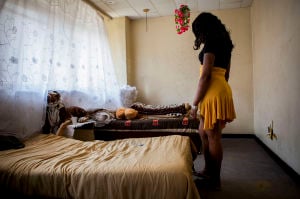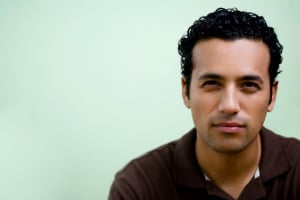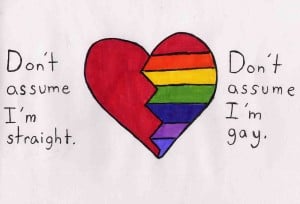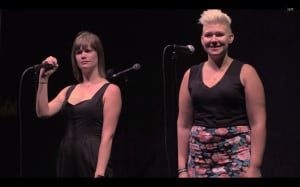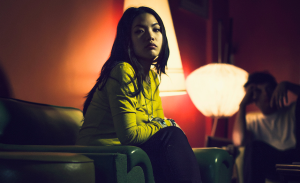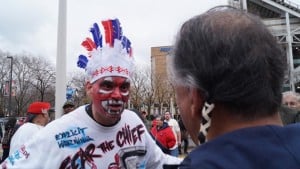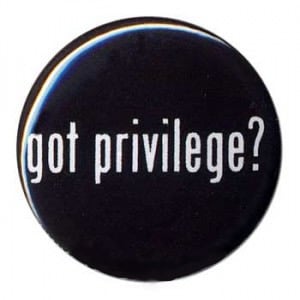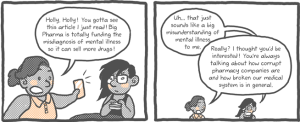Kai: This used to be my back door. My family was renting it for about $800, got sold for about 1.3 million or something like that.
My name’s Kai. I’m a 20 year old native from the Mission District. This is where we are right now, Mission District, San Francisco, California, Bay Area, United States.
The Mission for me, the Mission is home for me. Cultural center, center of my influences. A lot of places in the country that I’ve traveled, and in the world, are very segregated. Not only race-wise, but also class-wise. I feel like that’s something that’s very special about this city is this melting pot of everything.
The wealth is directly related to people’s displacement from their homes. That’s what happened to me and my family. My family was evicted twice. Once in 2005 from the Mission District, and once in 2008 from the Richmond District.
You got your kitchen, living room. It’s funny, this bar, it’s like a really hipster bar now, I guess. It used to be a motorcycle bar and I remember going to bed to basically the sound of engines. It was just, ahh. I’m not really affected by noise too much. That was my bedroom window.
This corner is completely different though. This used to be a Latino bakery called Mi Rancho where everyone in the neighborhood used to come. Now it’s luxury condos as well and a luxury salon, which is… That’s just the way it is I guess.
I just remember being in my house and having to stay in my room while people are going through the house and opening closets and opening doors and checking the house out. Having to be unseen, being told by my mother that I’m not supposed to be here right now.
20th and Mission. Not a lot has changed. This is beautiful because a lot of it hasn’t changed. I feel like looking around—there’s certain moments when I walk around I’m just like, “This is my neighborhood.” I have no idea what that is. No idea what that is.
We’re about to turn onto Clarion Alley – one of the craziest streets probably in the world, my opinion. I remember that as a kid, I used to have nightmares about that. That was like the scariest piece to me as a kid. I don’t know why, but there’s something about that that tripped me out.
My family used to live on this street before I was born, down the street, but that building got torn down. It’s just kind of the ideal world, in my opinion. I would love to see more streets like this.
This is the Mission District tour right here. Never seen that before.
Tour guide: It really connected this neighborhood to the rest of the city.
Kai: Been seeing a lot of changes around here, especially on Valencia Street. I feel like this is the just like the perfect representation of change. You got Dia de Los Muertos, street art, and then when you’re looking up, you got luxury restaurant and right above it, brand new luxury condos.
We’re going to turn from Valencia Street onto Mission Playground between 19th and 20th. Astroturf section that was established by city fields and parks and rec and stuff. Used to be complete cement. Locals were always playing on it before then. I feel like not until it got nice did the permits start coming.
Kai: You don’t understand. You don’t understand. It’s not about booking the field. It doesn’t matter. This field has never been booked. You don’t understand. This field has never been booked the last three years.
Unnamed Person 1: [crosstalk]
Kai: How long have you been in the neighborhood, bro? How long have you been in the neighborhood?
Unnamed Person 2: Who gives a shit [crosstalk]. Who cares about the neighborhood?
Unnamed Person 1: Over a year.
Kai: Over a year?
Kai: The argument was basically between neighborhood kids and tech workers coming in with an idea that they had a right to play and kick us off the field. I think a lot of Americans right now can relate to the issues of space and whose space is it and the fight over who belongs here.
Instead of deciding to play with us, they decided to take this half of the field, and the rest of us played over there. There is still this segregation of people. People that feel that they are a part of the community without showing that they’re a part of the community. I think if those tech workers, if people take their nose out of their phone, quite literally, and look into the real world, we would’ve been playing together.
I don’t know where I’d be if I didn’t have those places to go after school. I don’t want to think about where I would be. I know that these kids need this place, I know that this community needs places like this. If you know something’s wrong, you can’t just accept it for what it is. If you know that, yes, there’s a law in place that shouldn’t be in place, change it.
People forget that community is only relevant because of people. When you’re displacing all the people in the community, it’s like where does that culture go? Where does that community go? Yeah.






